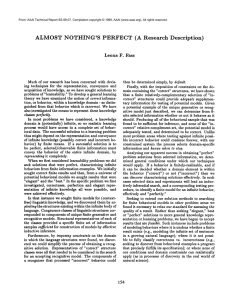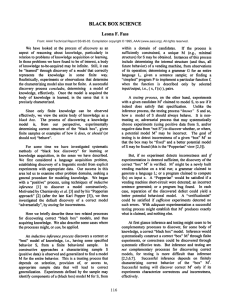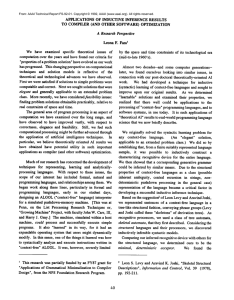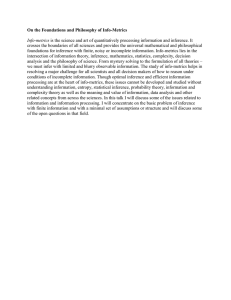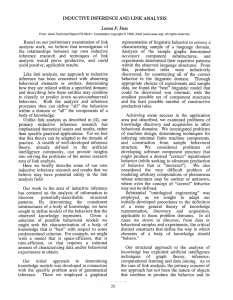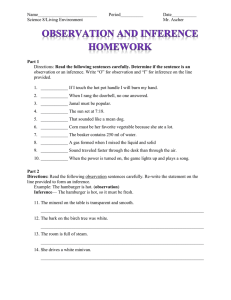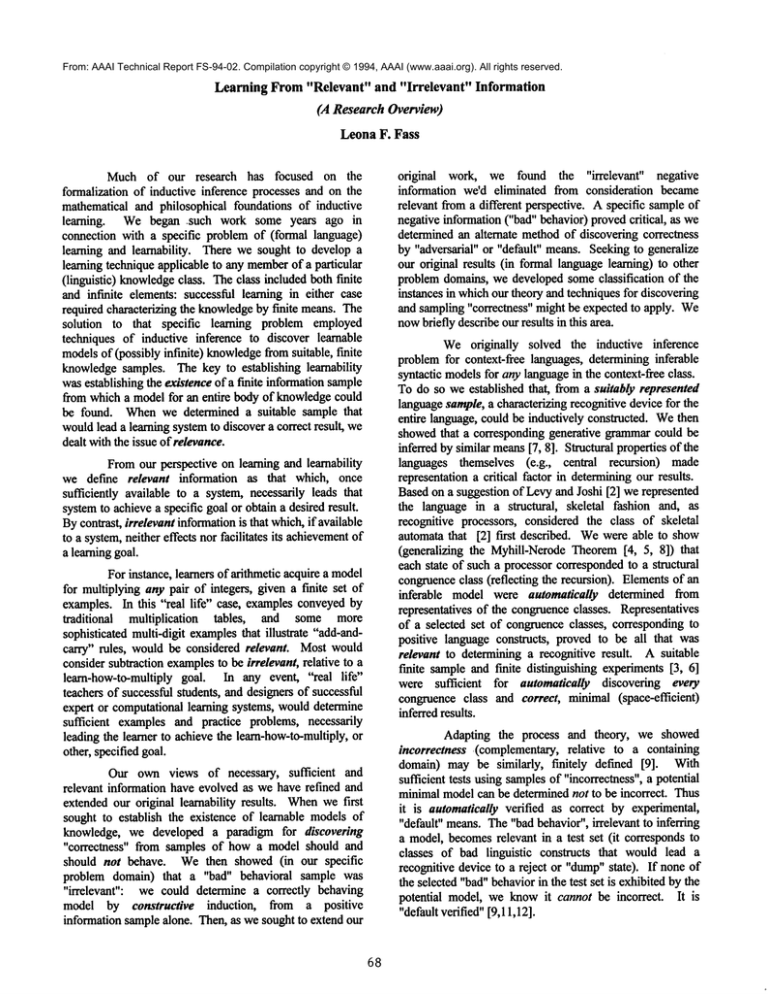
From: AAAI Technical Report FS-94-02. Compilation copyright © 1994, AAAI (www.aaai.org). All rights reserved.
Learning From "Relevant" and "Irrelevant" Information
(A Research Overview)
Leona F. Fass
Much of our research has focused on the
formalization of inductive inference processes and on the
mathematical and philosophical foundations of inductive
learning.
We began rsuch work some years ago in
connection with a specific problem of (formal language)
learning and learnability. There we sought to develop a
learning technique applicable to any memberof a particular
(linguistic) knowledgeclass. The class included both finite
and infinite elements: successful learning in either case
required characterizing the knowledgeby finite means. The
solution to that specific learning problem employed
techniques of inductive inference to discover learnable
modelsof (possibly infinite) knowledgefromsuitable, finite
knowledge samples. The key to establishing leamability
was establishing the existence of a finite informationsample
from which a model for an entire body of knowledgecould
be found. Whenwe determined a suitable sample that
wouldlead a learning systemto discover a correct result, we
dealt with the issue of relevance.
From our perspective on learning and leamability
we define relevant information as that which, once
sufficiently available to a system, necessarily leads that
systemto achieve a specific goal or obtain a desired result.
By contrast, irrelevant informationis that which,if available
to a system, neither effects nor facilitates its achievementof
a learning goal.
For instance, learners of arithmetic acquire a model
for multiplying any pair of integers, given a finite set of
examples. In this "real life" case, examples conveyedby
traditional
multiplication
tables, and some more
sophisticated multi-digit examplesthat illustrate "add-andcarry" rules, would be considered relevant. Most would
consider subtraction examplesto be irrelevant, relative to a
learn-how-to-multiply goal. In any event, "real life"
teachers of successful students, and designers of successful
expert or computational learning systems, woulddetermine
sufficient examples and practice problems, necessarily
leading the learner to achieve the learn-how-to-multiply, or
other, specified goal.
Our own views of necessary, sufficient
and
relevant information have evolved as we have refined and
extended our original leamability results. Whenwe first
sought to establish the existence of learnable models of
knowledge, we developed a paradigm for discovering
"correctness" from samples of how a model should and
should not behave. Wethen showed (in our specific
problem domain) that a "bad" behavioral sample was
"irrelevant": we could determine a correctly behaving
model by constructive
induction, from a positive
information samplealone. Then, as we sought to extend our
68
original work, we found the "irrelevant"
negative
information we’d eliminated from consideration became
relevant from a different perspective. A specific sampleof
negative information ("bad" behavior) provedcritical, as
determined an alternate methodof discovering correctness
by "adversarial" or "default" means. Seeking to generalize
our original results (in formal languagelearning) to other
problem domains, we developed someclassification of the
instances in whichour theory and techniquesfor discovering
and sampling "correctness" might be expected to apply. We
nowbriefly describe our results in this area.
Weoriginally solved the inductive inference
problemfor context-free languages, determining inferable
syntactic modelsfor any languagein the context-free class.
To do so we established that, from a suitably represented
languagesample, a characterizing recognifive device for the
entire language, could be inductively constructed. Wethen
showedthat a corresponding generative grammarcould be
inferred by similar means[7, 8]. Structural properties of the
languages themselves (e.g., central recursion) made
representation a critical factor in determiningour results.
Based on a suggestion of Levy and Joshi [2] we represented
the language in a structural, skeletal fashion and, as
recognitive processors, considered the class of skeletal
automata that [2] first described. Wewere able to show
(generalizing the Myhill-NerodeTheorem[4, 5, 8]) that
each state of such a processor correspondedto a structural
congruenceclass (reflecting the reeursion). Elementsof
inferable model were automatically determined from
representatives of the congruenceclasses. Representatives
of a selected set of congruenceclasses, corresponding to
positive language constructs, proved to be all that was
relevant to determining a recognitive result. A suitable
finite sample and finite distinguishing experiments[3, 6]
were sufficient for automatically discovering every
congruence class and correct, minimal (space-efficient)
inferred results.
Adapting the process and theory, we showed
incorrectness (complementary, relative to a containing
domain) may be similarly, finitely defined [9]. With
sufficient tests using samplesof "incorrectness", a potential
minimalmodelcan be determined not to be incorrect. Thus
it is automatically verified as correct by experimental,
"default" means.The "bad behavior", irrelevant to inferring
a model, becomesrelevant in a test set (it corresponds to
classes of bad linguistic constructs that would lead a
recognitive device to a reject or "dump"state). If none of
the selected "bad" behaviorin the test set is exhibited by the
potential model, we knowit cannot be incorrect. It is
"default verified" [9,11,12].
Wehave found this inference/testing paradigm,
using positive/negative, relevant/irrelevant information is
successful in modelingfinitely-realizable behaviors with
decidable membership queries. (Then we can finitely
characterize the behavior and its complement, and
distinguish membersor representatives of the relevant class
from those that are not.) Thus learning or reasoning about
many language processors, finite-state
devices, and
"minimal"compilers are important areas to whichour theory
can be successfully applied.
Wehave looked into problems of learning or
reasoning about programsand software in general, and find
our theory yields results no worse than those of other
theoreticians.
Weinvestigated these problems at the
suggestion of Cherniavsky [1], and have found the
inference/testing, relevant/irrelevant information sampling
paradigm to yield a reasonable approach to determining
approximately correct (minimal) software. The finite
experiments to automatically construct by induction (or
default verify) approximationsto correct soRware,produce
results that improveupon actual soRwaredesign processes
often in use today. Verification by proof is not necessary.
"Correctness" is assured from the sample information, using
inductive constructive or "default" means[9-11].
In the case of learning behaviors, or bodies of
knowledge,that cannot be described in terms so simple as
might be exhibited by a programor a "finite-state device",
we are only just beginningto look into applications of our
theory.
Our approach to relevant sampling, and
approximations to modelsof general bodies of knowledge,
is described in [11]. The critical factor in such problems
maywell be distinguishing what is relevant from what is
not.
[6]
Selected Pertinent Papers By The Author
[7]
Fass, L. F., "Leamability of CFLs: Inferring
Syntactic Models from Constituent Structure",
1987 Linguistic Institute,
Meeting on the
Theoretical Interactions of Linguistics and Logic,
Stanford, July 1987. Abstract, J. Symbolic Logic,
Vol. 53, No. 4 (December,1988), pp. 1277-1278.
Research Note, SIGART Special lssue on
KnowledgeAcquisition (April 1989), pp. 175-176.
[8]
Fass, L. F., "A MinimalDeterministic Acceptor for
Any (Structured)
Context-Free Language",
preliminary version (1987). Extended version,
1990-91 AnnualMeeting of the Linguistic Society
of America, Chicago (January, 1991); 35 pp,
abstracted in MeetingHandbook,p. 17.
[9]
Fass, L. F., "A CommonBasis for Inductive
Inference and Testing", Proc. of the Seventh
Pacific Northwest Software Quality Conference,
Portland (September, 1989), pp. 183-200.
[lO]
Fass, L. F., "Software Design as a Problem in
Learning Theory (A Research Overview)", Notes
of AAA1-92, Workshop on Automating Software
Design, San Jose (July, 1992), pp. 48-49.
[11]
Fass, L. F., "Inference and Testing: When"Prior
Knowledge’is Essential to Learning", in Notes of
AAAI-92 Workshop on Constraining Learning
Through Prior Knowledge, San Jose, CA(July,
1992), pp. 88-92.
[12]
Fass, L.F., "On the Verification of a Grammaras
’Correct’ ", presented at Ninth Annual Conference
on Computingand Philosophy, Occidental College,
August 1994.
A SELECTION OF REFERENCES
[1]
Chemiavsky, J. C., "Computer Systems as
Scientific Theories: A Popperian Approach To
Testing", Proc. of the Fifth Pacific Northwest
Software Quality Conference, Portland (October,
1987), pp. 297-308.
[21
Levy, L. S., and A. K. Joshi, "Skeletal Structural
Descriptions", Inf. Contr., Vol. 39 (1978), pp. 192211.
[3]
Moore, E. F., "Gedanken-Experiments
on
Sequential Machines", in AutomataStudies, C. E.
Shannon and J. McCarthy, Eds., Princeton
University Press, 1956, pp. 129-153.
[4]
Myhill, J., "Finite Automataand the Representation
of Events", WADC
Tech. Rept., 57-624, WrightPatterson AFB,1957.
[5]
Nerode, A., "Linear AutomatonTransformations",
Proc. AM~,IX (1959), pp. 541-544.
69
Thatcher, J. W., and J. B. Wright, "Generalized
Finite AutomataTheory with an Application to a
Decision Problem of Second Order Logic", Math.
Sys. Th., Vol. 2 (1970), pp. 57-81.
LeonaFo Fasa received a B.S. in Mathematicsand Science
Educationfrom ComellUniversity and an M.S.E.and Ph.D. in
Computerand Information Science from the University of
Pennsylvania.Prior to obtaining her Ph.D.she held research,
administrative and/or teaching positions at Pennand Temple
University. Since then she has been on the faculties of the
University of Califomia, Georgetown
University and the Naval
Postgraduate School. Her research primarily has focused on
languagestructure and processing;knowledge
acquisition; andthe
general interactions of logic, languageandcomputation.Shehas
had particular interest in inductive inference processes, and
applications/adaptationsof inference results to the practical
domain.Dr. Fass maybe reachedat
Mailing address: P.O. Box2914, CarmelCA93921

